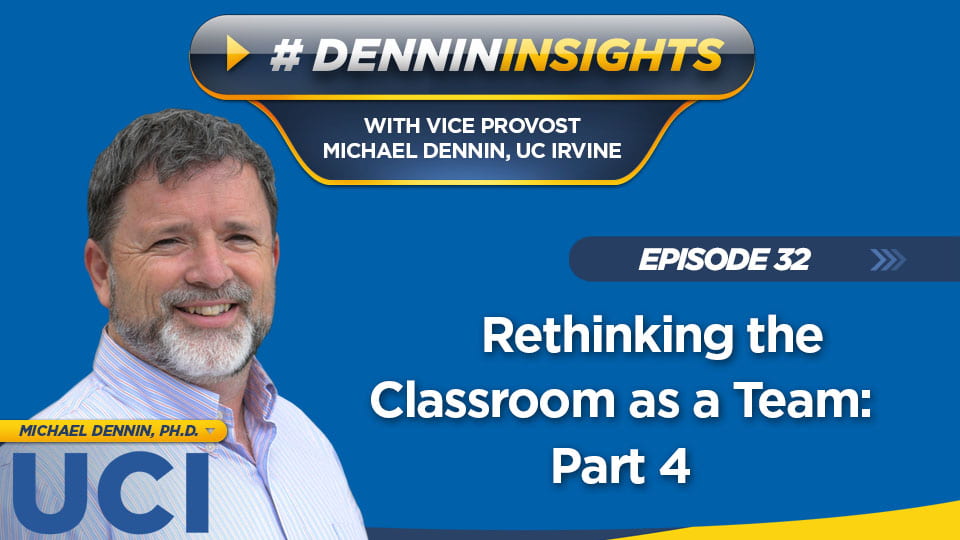
This is the final installment of the series based on the panel I hosted with UCI coaches and School of the Arts faculty on April 20, 2022 (watch the panel recording here). The focus of this final reflection is best summarized by the question: How long should you be punished for failure?
A core principle of learning is that we learn from our mistakes. In other words, a major part of learning is getting things wrong, receiving feedback, and correcting our mistakes. This requires an atmosphere where “getting things wrong” is not only allowed but, in a very real sense, actively encouraged. It also requires understanding the concept of recovery time—how quickly can one learn from the mistake and move on.
The idea of recovering from mistakes and learning from errors is baked into athletics and art performances in a variety of ways. Obviously, recovery time is critical to any practice or rehearsal session. But what happens during games or performances is less obvious. In the course of the game, there are often two levels where players learn from mistakes. In sports with an opponent, one type of learning occurs in real-time as players adjust to their opponents and what they are doing. The other type of learning occurs when players and coaches review the game in preparation for the next game. Especially in this latter case, it is essential that that review of mistakes is not seen as a penalty but as a chance to improve and do better the next time.
But there is another sense in which sports and artistic events have a short memory for mistakes. It is in the rating of performances and outcomes. On the one hand, some averaging over mistakes occurs (i.e. if you give up more points than the other team you do lose that game). But it is only short-term averages that matter. When a team loses to an opponent, the loss may seem like a massive deal at the moment, but when they face the same opponent later in the season, both teams start fresh—the team that lost before does not start with a negative score to overcome! In the arts, if an orchestra has an amazing concert or a theater troupe puts on a great play, no one says, “Yeah, but they had three practice sessions that were really bad, so I am going to rate their overall performance lower.”
This is what I mean when I talk about having a short memory for mistakes. In both sports and the arts, mistakes are expected. This expectation makes it easier for both players/performers and coaches/directors to move on pretty quickly. They can learn from their mistakes and move on because there are not typically long-term repercussions for missteps.
Unfortunately, when it comes to academic spaces, we tend to create systems that do not allow students to truly embrace their mistakes and learn from them. One big issue is the limited amount of formative assessments and feedback they receive. While this is starting to change, the fact remains that almost any grading/feedback system resembles a value judgment where being wrong is bad rather than something to learn from. There are many reasons for this, such as issues with time and scale, and I don’t point this out to shame my fellow faculty and instructors. However, it’s important that we acknowledge the limitations of our current practices and policies and how they can lead to negative consequences for our students. And one particularly conspicuous weakness in our grading/assessments is how effectively we permatize mistakes.
I would argue that permanitizing mistakes can occur both locally and globally. Locally, there are many grading systems where grades are a straight average over various assessments. This means that mistakes made early on in the course count against a student even if they master the material by the end of the course. Globally, most handling of grades and transcripts focuses on ensuring that all the bad grades (mistakes) are recorded no matter what. This is often done in the name of an accurate record, but it does not take into account things like selecting the wrong major.
I have already spoken about our approaches to assessment and how we should be recording and communicating a student’s accomplishments at length in other blog posts. So I will not say much more here. Also, I know we are making progress in this area, and many faculty are explicitly institutionalizing opportunities for students to learn from their mistakes into their courses. However, after listening to coaches and artistic directors fully embrace the central concept of learning from one’s mistakes, I felt it worthwhile to place these concepts in this context. I also wanted to compare academics to athletics and the arts to show that fair assessment and flexibility in other highly-competitive environments with very high standards is not about lowering standards. Rethinking how we grade and assess students actually aligns really well with the maintenance of high standards; it simply calls for the setting of appropriate standards that support our fundamental goal of student learning and creating lifelong learners.
Recent Comments